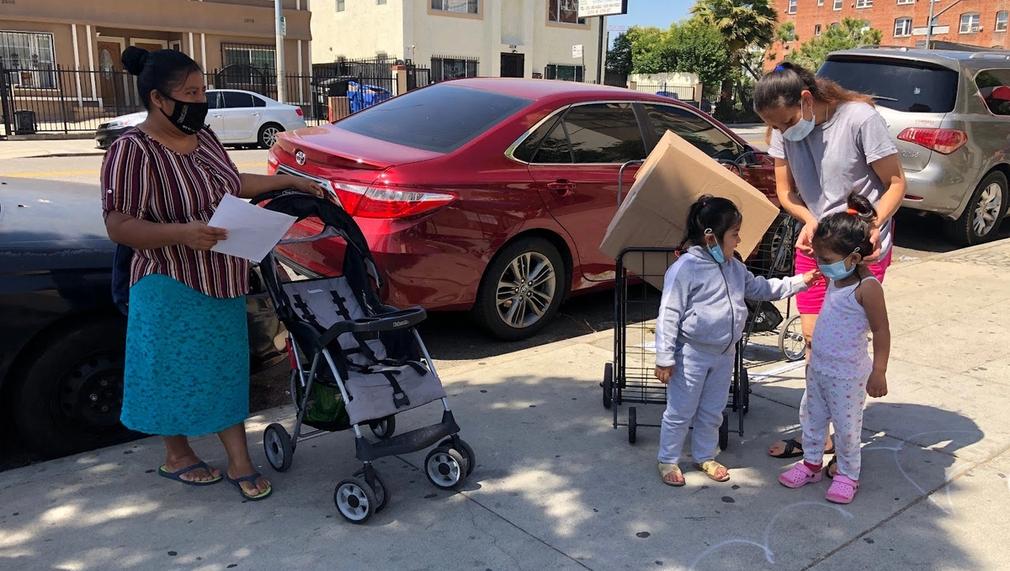Partners and promoters address food injustice
We believe the solutions to complex social issues originate from those most affected. Best Start Region 1 (BSR1) addresses the social determinants of health in East LA, Metro LA, South El Monte/El Monte, and Southeast LA by revitalizing our Food Distribution Hub (Hub). Our efforts empower residents to transform systems to achieve physical, psychological, intellectual, and emotional safety and security. Supported by our community promoters, we bridge the gap between marginalized communities and basic essentials to uplift all members of society.

What is the primary issue area that your application will impact?
Food insecurity and access to basic needs
In what stage of innovation is this project, program, or initiative?
Expand existing project, program, or initiative (expanding and continuing ongoing, successful work)
What is your understanding of the issue that you are seeking to address?
The collapse of Los Angeles County’s health and human services during the COVID-19 pandemic, especially in historically neglected communities, reminds us that the deprivation of universal human rights is often exacerbated during crises. A landscape analysis of BSR1 communities showed they “face historic disenfranchisement and oppression through political, economic, social, and environmental factors.” One persistently unaddressed need is food insecurity and access to basic essentials. Surveys and listening sessions with residents surfaced that: 1) 62% of households with children experienced food insecurity due to pandemic-related income loss, 2) 34% of families identified at least one social need (e.g., food insecurity, housing insecurity, difficulty accessing childcare, financial strain) and 3) 13% had three or more needs while navigating complex health priorities. Urgent action is still needed to address these systemic failures and ensure equitable access to resources.
Describe the project, program, or initiative this grant will support to address the issue.
Since 2009, Para Los Ninos’s (PLN) program, BSR1, has mobilized over 1,000 residents and stakeholders such as nonprofits, elected officials, faith-based groups, etc. to address community-identified priorities. In response to the pandemic, BSR1 collaboratively developed a Community Bill of Human Rights, launched the Community Promoters Transforming Systems of Care program, and established a Food Distribution Hub to provide families with essential items and fresh, culturally appropriate food.
Beginning in April 2020, BSR1 partnered with 25 organizations such as Homies Unidos, Food Forward, and AltaMed to leverage resources and forge new partnerships, helping families stabilize their budgets and have healthy meals during desperate times. BSR1 promoters utilized their cultural fluency and specialized knowledge to help Hub partners provide high-quality food and sanitary boxes to 9,316 families, prioritizing those with children and single-parent households. Clients shared that they considered our boxes “the best in town.” The project expanded to include home deliveries via 211LA/Doordash and MTA’s VIA for those facing transportation barriers, helping families like Maria Gutierrez’s: “It helps me a lot because of my age and… my grandkids.” Nervous to use public transportation, Maria relied on our home deliveries to stay safe and healthy. She shared that without this program, she would not know how to feed her family: “I would be really sad. I would have to look for alternatives.”
Describe how Los Angeles County will be different if your work is successful.
Although our main funder paused our food distribution efforts, our vision for 2050 is to alleviate family poverty by reinstituting our Hub, identifying strategies to leverage resources, forging additional food justice partnerships, and paving new employment pathways for promoters. With new funding, we will resume food distribution in partnership with Homies Unidos and City Council District (CD) 13 and potentially CD 1 while addressing intersectional issues such as housing, public transit, and economic well-being. Concurrently, we will launch our leadership training institute and host job fairs to build the community’s capacity to become promoters. Beyond our partnership with Children’s Hospital of Los Angeles, we are working with CD 1 to implement our model to advance community mobilization and shared governance. Additional funding will help us integrate this model into new sectors, to foster self-efficacy and systemic change that ensures a more equitable LA for residents like Maria.
What evidence do you have that this project, program, or initiative is or will be successful, and how will you define and measure success?
As a place-based partnership that regularly utilizes data to support decision-making, BSR1 uses Community Based Action Research (CBAR) as its guiding research approach to implement equitable evaluation efforts. CBAR is a strengths-based approach that fosters inclusive participation, uplifting community voices and collective action. We collect data through focus groups, surveys, and mapping activities to accurately reflect the community’s voice. Residents are involved in every step, from framing research questions to analyzing findings so that evaluations are equitable and representative.
To gauge success, we track qualitative and quantitative outcomes, such as the number of families we served through the Hub, and testimonials like Maria’s. As an agency, PLN continuously refines its efforts based on feedback and data analysis to adapt to emerging needs. This dynamic approach ensures our programs deliver meaningful, sustainable impact and drive systemic change within our community.
Approximately how many people will be impacted by this project, program, or initiative?
Direct Impact: 300.0
Indirect Impact: 19,200.0